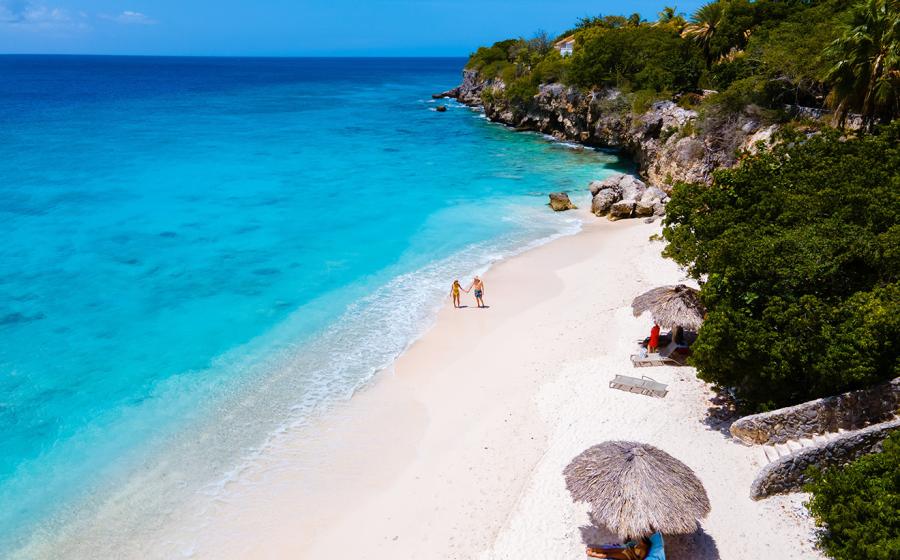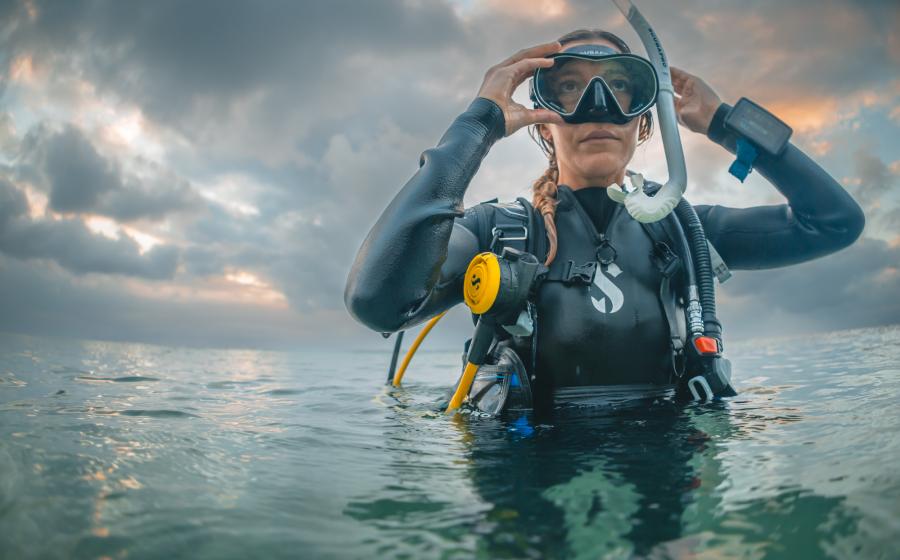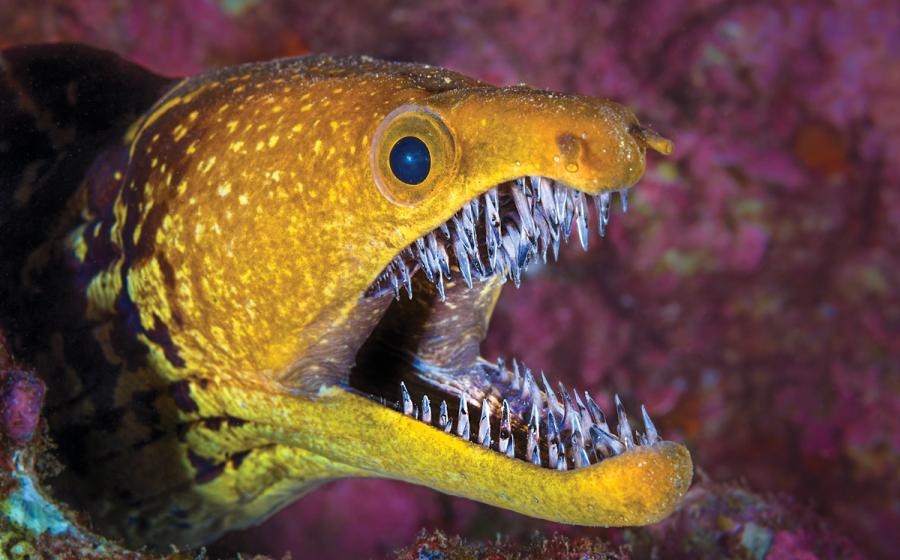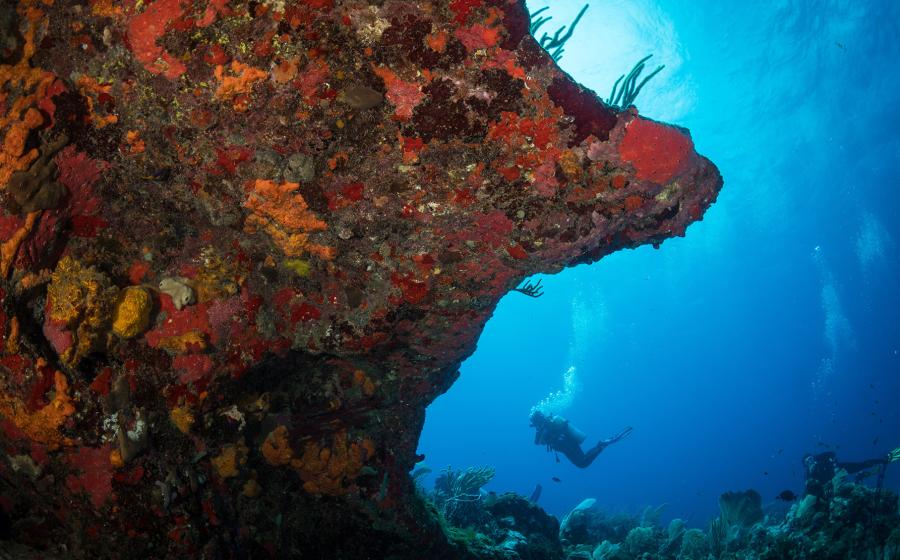Stop the Dive Wreckers
December 2006
By Selene Yeager
Any traveler knows you have to expect the unexpected. By now scuba travelers should also know to expect the expected--specifically ear squeezes, gastrointestinal issues, dehydration and all the other nagging pains that can accompany the sport. This month we round up the best advice for keeping the most common dive vacation ills at bay.
Seasickness
Why it happens: "Sensory mismatch." Your feet are telling your brain that you're on solid ground, but you're really rocking and rolling on the high seas. Your brain gets confused; you get sick.
Prevention is the best medicine: Eat light, frequent meals to prevent low blood sugar, which exacerbates nausea. Look out at the horizon. Try an anti-motion sickness medication like scopolamine, which comes in a patch (Transderm Scop) that can be placed behind your ear four hours before you board the boat. "The patch can cause dry mouth and blurred vision," cautions Lewis Kohl, M.D., chairman of emergency medicine at Long Island College Hospital in Brooklyn, N.Y. Some divers need to cut them in half to get the benefits without the side effects.
If it's too late, treat it by: Lots of fresh air helps. Stomach settlers like Coca-Cola and ginger ale can calm mild queasiness. If your gills go green every time you set sail, ask your doc for a script for metoclopramide (Reglan) before you go. "It's a central nauseous suppressor and works incredibly fast," says Kohl.
Ear Pain
Why it happens: The eustachian tube, which helps maintain equal pressure between the outer and inner ear, malfunctions by swelling or being blocked by mucus, leaving you with a pressure imbalance and a stabbing, squeezing pain as you descend.
Prevention is the best medicine: Keep congestion (which hinders proper eustachian tube functioning) to a minimum by drinking hot herbal tea and avoiding sinus irritants like smoke and boat fumes. If you have chronic sinus woes, daily sinus rinsing with a product like Ayr Sinus Rinse or NeilMed's Sinus Rinse can be a life (and dive) saver. "Saline nasal rinses and irrigators wash away irritants like dust, pollutants, and bacteria, so your mucus membrane and cilia are healthier and function better," says dive researcher David F. Colvard, M.D., of Raleigh, N.C. "Preliminary research with NeilMed's SinusRinse shows it can reduce the use of pre-dive decongestants and minimize rebound congestion," he says.
If it's too late, treat it by: If it's an hour 'til dive time and you're still blocked, go ahead and take Sudafed to shrink the inflamed sinus passages and relieve pressure on the eustachian tubes. If your ears are stubbornly stuck at some point during descent, fin back up a few feet and try equalizing again. Wiggle your jaw, tilt your head from side to side and gently blow air through the passages. Never force it.
Jet Lag
Why it happens: Circadian-rhythm disruption. Your body is accustomed to one schedule and you toss it a biological monkey wrench by switching time zones. Your internal clock says it's midafternoon, yet the sun is setting on the horizon. The result: Insomnia, exhaustion, headache and general malaise.
Prevention is the best medicine: "Sleep is your best defense," says Kohl. Sleep on the plane, if you can (a drowse-inducing decongestant can help you relax and clear your sinuses to boot). "If possible, plan your trip to arrive at your destination close to bedtime," he says. Research shows flying at night exacerbates jet lag.
If it's too late, treat it by: Bright sunlight, a brisk walk and a shower. Experts say sunlight and activity may help resynchronize your internal clock. A shower boosts circulation and gives you a much-needed energy boost.
Hangover
Why it happens: Too much alcohol leads to dehydration and electrolyte imbalance, leaving you fuzzy-headed, queasy and fatigued the next day.
Prevention is the best medicine: Limit your alcohol consumption to two or three the night before a dive. Eat plenty of food with your booze to help slow alcohol absorption and prevent low-blood sugar. "Order a pitcher of water and drink two glasses of water for every alcoholic drink," advises Kohl. "Preventing dehydration can head off a hangover." If you overdid it, drink three glasses of water when you get home and take Motrin [ibuprofen] to reduce headache-causing inflammation," says Kohl.
If it's too late, treat it by: Get up an hour or two before you have to, drink a big glass of water or Gatorade (which replaces potassium and magnesium that are depleted by drinking), take ibuprofen, and go back to bed 'til you need to get up. This can stave off mild hangovers.
Sunburn
Why it happens: The sun emits ultraviolet radiation that literally burns the skin, causing inflammation of the skin.
Prevention is the best medicine: Sunscreen with active ingredients avobenzone (Parsol 1789), zinc oxide, oxybenzone or titanium dioxide, is your best bet. Use a lot. Studies show most people apply less than half the amount they need for full-body protection. Cover yourself completely.
If it's too late, treat it by: "Apply aloe vera gel and take ibuprofen to reduce the inflammation and pain," says Kohl. You can also apply cool, wet compresses of equal parts milk and water to soothe hot, sensitive skin. Drink plenty of water. If the burn is bad, don't dive.
Traveler's trots
Why it happens: The most common culprit behind traveler's diarrhea is E. coli bacterium. But there are any number of bugs that can trigger a bout; all it takes is exposure to bacteria your belly isn't used to.
Prevention is the best medicine: Boil it. Cook it. Peel it. Or forget it. Everyone knows it, yet they still forget that salsa and ice cream aren't cooked foods and that ice isn't usually made from bottled water. "Think before you eat anything," says Kohl. "And take Pepto-Bismol. It helps bind toxins and prevent infection."
If it's too late, treat it by: Imodium A-D slows the digestive tract to stop diarrhea. It can work wonders for mild cases, but if you have a lot of painful cramping or blood or mucus in your stool, call a doctor.
Dehydration
Why it happens: Water sports like diving are surprisingly dehydrating. Wind and sun sap moisture from your skin; cold water temps make you pee more, running around sightseeing makes you forget to drink, beachside bars entice you with dehydrating libations. The end result is you end up down a few pints of fluid, causing headache, fatigue, poor performance and an increased risk for DCS.
Prevention is the best medicine: Two to three days before your dive, and certainly the day of, aim to drink about nine cups of water or sports drink for a 140-pound woman and 11 cups for a 180-pound man. That sounds like a lot, but the latest research shows that caffeine is not the diuretic we once thought it was, so your morning and afternoon cups of Joe count toward fluid intake as does fruit juice and other beverages except alcohol.
If it's too late, treat it by: The body rehydrates remarkably quickly, says Kohl. "But stick to water or a sports beverage for rehydration." Sodas and juices have too much sugar, which slows down fluid absorption from the stomach. If you feel the effects of dehydration (you're thirsty, weak or headachy), replenish fluids by drinking about two liters of fluid during the next two to four hours.
Panic
Why it happens: Something goes wrong or doesn't feel right and suddenly you're hyperventilating and bolting dangerously for the surface.
Prevention is the best medicine: "Practice prevents panic," says Colvard. "People who know what to do when their regulator free flows or their mask is kicked off don't panic; they solve the problem." Always do a checkout dive to make sure your wetsuit still fits (nothing like not being able to breathe to induce anxiety), equipment still works and your skills are sharp. Review the dive details with the divemaster, so there are no surprises. Before a dive, assess your mental state. Ask yourself, "Am I anxious? Am I breathing too fast?" If you answer yes, something about the dive is worrying you.
If it's too late, treat it by: Breathing! Stop (or at least slow down); breathe deeply; think about what you need to do; then do it. Of course, it's often breathing--specifically the inability to do so--that causes panic. If you're out of air or otherwise having trouble breathing, the other steps still apply. Think about your options. Most people can easily hold their breath for a minute. That's enough time to find your backup air (or buddy) and get a breath.
Headache
Why it happens: Why doesn't it? Bright sun, seasickness, dehydration, restrictive clothing, pressure changes, cold water, carbon dioxide buildup ... the list of head thumpers is long.
Prevention is the best medicine: Keep yourself as comfortable as possible. That means loosening too-tight straps, wearing temperature-appropriate clothing and gear, staying hydrated, and relaxing your jaw and taking full, even breaths off your regulator.
If it's too late, treat it by: Fresh air, water and your pain-reliever of choice. Though most dive-related headaches aren't serious, experts caution that they can be a symptom of decompression sickness. So if your skull pounding is accompanied by joint pain, nausea, dizziness, and so on, seek medical help ASAP.
December 2006
By Selene Yeager
Any traveler knows you have to expect the unexpected. By now scuba travelers should also know to expect the expected--specifically ear squeezes, gastrointestinal issues, dehydration and all the other nagging pains that can accompany the sport. This month we round up the best advice for keeping the most common dive vacation ills at bay.
Seasickness
Why it happens: "Sensory mismatch." Your feet are telling your brain that you're on solid ground, but you're really rocking and rolling on the high seas. Your brain gets confused; you get sick.
Prevention is the best medicine: Eat light, frequent meals to prevent low blood sugar, which exacerbates nausea. Look out at the horizon. Try an anti-motion sickness medication like scopolamine, which comes in a patch (Transderm Scop) that can be placed behind your ear four hours before you board the boat. "The patch can cause dry mouth and blurred vision," cautions Lewis Kohl, M.D., chairman of emergency medicine at Long Island College Hospital in Brooklyn, N.Y. Some divers need to cut them in half to get the benefits without the side effects.
If it's too late, treat it by: Lots of fresh air helps. Stomach settlers like Coca-Cola and ginger ale can calm mild queasiness. If your gills go green every time you set sail, ask your doc for a script for metoclopramide (Reglan) before you go. "It's a central nauseous suppressor and works incredibly fast," says Kohl.
Ear Pain
Why it happens: The eustachian tube, which helps maintain equal pressure between the outer and inner ear, malfunctions by swelling or being blocked by mucus, leaving you with a pressure imbalance and a stabbing, squeezing pain as you descend.
Prevention is the best medicine: Keep congestion (which hinders proper eustachian tube functioning) to a minimum by drinking hot herbal tea and avoiding sinus irritants like smoke and boat fumes. If you have chronic sinus woes, daily sinus rinsing with a product like Ayr Sinus Rinse or NeilMed's Sinus Rinse can be a life (and dive) saver. "Saline nasal rinses and irrigators wash away irritants like dust, pollutants, and bacteria, so your mucus membrane and cilia are healthier and function better," says dive researcher David F. Colvard, M.D., of Raleigh, N.C. "Preliminary research with NeilMed's SinusRinse shows it can reduce the use of pre-dive decongestants and minimize rebound congestion," he says.
If it's too late, treat it by: If it's an hour 'til dive time and you're still blocked, go ahead and take Sudafed to shrink the inflamed sinus passages and relieve pressure on the eustachian tubes. If your ears are stubbornly stuck at some point during descent, fin back up a few feet and try equalizing again. Wiggle your jaw, tilt your head from side to side and gently blow air through the passages. Never force it.
Jet Lag
Why it happens: Circadian-rhythm disruption. Your body is accustomed to one schedule and you toss it a biological monkey wrench by switching time zones. Your internal clock says it's midafternoon, yet the sun is setting on the horizon. The result: Insomnia, exhaustion, headache and general malaise.
Prevention is the best medicine: "Sleep is your best defense," says Kohl. Sleep on the plane, if you can (a drowse-inducing decongestant can help you relax and clear your sinuses to boot). "If possible, plan your trip to arrive at your destination close to bedtime," he says. Research shows flying at night exacerbates jet lag.
If it's too late, treat it by: Bright sunlight, a brisk walk and a shower. Experts say sunlight and activity may help resynchronize your internal clock. A shower boosts circulation and gives you a much-needed energy boost.
Hangover
Why it happens: Too much alcohol leads to dehydration and electrolyte imbalance, leaving you fuzzy-headed, queasy and fatigued the next day.
Prevention is the best medicine: Limit your alcohol consumption to two or three the night before a dive. Eat plenty of food with your booze to help slow alcohol absorption and prevent low-blood sugar. "Order a pitcher of water and drink two glasses of water for every alcoholic drink," advises Kohl. "Preventing dehydration can head off a hangover." If you overdid it, drink three glasses of water when you get home and take Motrin [ibuprofen] to reduce headache-causing inflammation," says Kohl.
If it's too late, treat it by: Get up an hour or two before you have to, drink a big glass of water or Gatorade (which replaces potassium and magnesium that are depleted by drinking), take ibuprofen, and go back to bed 'til you need to get up. This can stave off mild hangovers.
Sunburn
Why it happens: The sun emits ultraviolet radiation that literally burns the skin, causing inflammation of the skin.
Prevention is the best medicine: Sunscreen with active ingredients avobenzone (Parsol 1789), zinc oxide, oxybenzone or titanium dioxide, is your best bet. Use a lot. Studies show most people apply less than half the amount they need for full-body protection. Cover yourself completely.
If it's too late, treat it by: "Apply aloe vera gel and take ibuprofen to reduce the inflammation and pain," says Kohl. You can also apply cool, wet compresses of equal parts milk and water to soothe hot, sensitive skin. Drink plenty of water. If the burn is bad, don't dive.
Traveler's trots
Why it happens: The most common culprit behind traveler's diarrhea is E. coli bacterium. But there are any number of bugs that can trigger a bout; all it takes is exposure to bacteria your belly isn't used to.
Prevention is the best medicine: Boil it. Cook it. Peel it. Or forget it. Everyone knows it, yet they still forget that salsa and ice cream aren't cooked foods and that ice isn't usually made from bottled water. "Think before you eat anything," says Kohl. "And take Pepto-Bismol. It helps bind toxins and prevent infection."
If it's too late, treat it by: Imodium A-D slows the digestive tract to stop diarrhea. It can work wonders for mild cases, but if you have a lot of painful cramping or blood or mucus in your stool, call a doctor.
Dehydration
Why it happens: Water sports like diving are surprisingly dehydrating. Wind and sun sap moisture from your skin; cold water temps make you pee more, running around sightseeing makes you forget to drink, beachside bars entice you with dehydrating libations. The end result is you end up down a few pints of fluid, causing headache, fatigue, poor performance and an increased risk for DCS.
Prevention is the best medicine: Two to three days before your dive, and certainly the day of, aim to drink about nine cups of water or sports drink for a 140-pound woman and 11 cups for a 180-pound man. That sounds like a lot, but the latest research shows that caffeine is not the diuretic we once thought it was, so your morning and afternoon cups of Joe count toward fluid intake as does fruit juice and other beverages except alcohol.
If it's too late, treat it by: The body rehydrates remarkably quickly, says Kohl. "But stick to water or a sports beverage for rehydration." Sodas and juices have too much sugar, which slows down fluid absorption from the stomach. If you feel the effects of dehydration (you're thirsty, weak or headachy), replenish fluids by drinking about two liters of fluid during the next two to four hours.
Panic
Why it happens: Something goes wrong or doesn't feel right and suddenly you're hyperventilating and bolting dangerously for the surface.
Prevention is the best medicine: "Practice prevents panic," says Colvard. "People who know what to do when their regulator free flows or their mask is kicked off don't panic; they solve the problem." Always do a checkout dive to make sure your wetsuit still fits (nothing like not being able to breathe to induce anxiety), equipment still works and your skills are sharp. Review the dive details with the divemaster, so there are no surprises. Before a dive, assess your mental state. Ask yourself, "Am I anxious? Am I breathing too fast?" If you answer yes, something about the dive is worrying you.
If it's too late, treat it by: Breathing! Stop (or at least slow down); breathe deeply; think about what you need to do; then do it. Of course, it's often breathing--specifically the inability to do so--that causes panic. If you're out of air or otherwise having trouble breathing, the other steps still apply. Think about your options. Most people can easily hold their breath for a minute. That's enough time to find your backup air (or buddy) and get a breath.
Headache
Why it happens: Why doesn't it? Bright sun, seasickness, dehydration, restrictive clothing, pressure changes, cold water, carbon dioxide buildup ... the list of head thumpers is long.
Prevention is the best medicine: Keep yourself as comfortable as possible. That means loosening too-tight straps, wearing temperature-appropriate clothing and gear, staying hydrated, and relaxing your jaw and taking full, even breaths off your regulator.
If it's too late, treat it by: Fresh air, water and your pain-reliever of choice. Though most dive-related headaches aren't serious, experts caution that they can be a symptom of decompression sickness. So if your skull pounding is accompanied by joint pain, nausea, dizziness, and so on, seek medical help ASAP.






